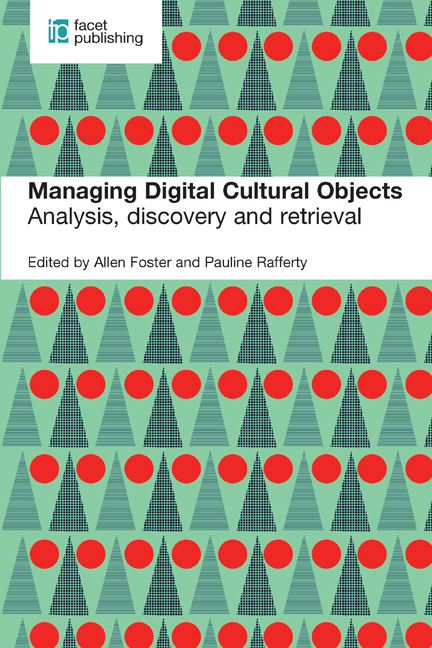Book contents
- Frontmatter
- Contents
- List of figures and tables
- Contributors
- Introduction
- PART 1 ANALYSIS AND RETRIEVAL OF DIGITAL CULTURAL OBJECTS
- 1 Managing, searching and finding digital cultural objects: putting it in context
- 2 Data modelling for analysis, discovery and retrieval
- 3 The digital traces of user-generated content: how social media data may become the historical sources of the future
- PART 2 DIGITIZATION PROJECTS IN LIBRARIES, ARCHIVES AND MUSEUMS: CASE STUDIES
- PART 3 SOCIAL NETWORKING AND DIGITAL CULTURAL OBJECTS
- Index
3 - The digital traces of user-generated content: how social media data may become the historical sources of the future
from PART 1 - ANALYSIS AND RETRIEVAL OF DIGITAL CULTURAL OBJECTS
Published online by Cambridge University Press: 09 June 2018
- Frontmatter
- Contents
- List of figures and tables
- Contributors
- Introduction
- PART 1 ANALYSIS AND RETRIEVAL OF DIGITAL CULTURAL OBJECTS
- 1 Managing, searching and finding digital cultural objects: putting it in context
- 2 Data modelling for analysis, discovery and retrieval
- 3 The digital traces of user-generated content: how social media data may become the historical sources of the future
- PART 2 DIGITIZATION PROJECTS IN LIBRARIES, ARCHIVES AND MUSEUMS: CASE STUDIES
- PART 3 SOCIAL NETWORKING AND DIGITAL CULTURAL OBJECTS
- Index
Summary
It is our pleasure to donate access to the entire archive of public Tweets to the Library of Congress for preservation and research. It's very exciting that tweets are becoming part of history.
Stone, 2010Introduction
When Twitter Inc. announced that it was donating its entire collection of all tweets to the Library of Congress for ‘preservation and research’ (Stone, 2010), reactions to this were not exclusively positive. In the comment sections of online news articles reporting about this agreement between Twitter and the Library, there are a number of very critical voices. For example, as a comment to a CNN online article, someone wrote: ‘Seriously? Do they not realize that 99% of tweets are worthless babble that read something like ‘‘Just woke up. Going to Starbucks now. Getting latte.’’ By all means, archive that important moment in American history. (Insert eye roll smiley here).’ This chapter addresses this sort of criticism by showing how user-generated texts, videos and photos are cultural artefacts that may indeed become sources for ‘important moments’ in (not only American) history. It will take a look at some popular social media sites to illustrate their potential as future sources for historians or other interested members of the public. In doing so it contributes to a field that is still in its beginning even within the community of researchers in library and information science and documentation studies, and practitioners in cultural (heritage) institutions such as archives, libraries and museums, who may all have to consider the challenges outlined below for their practical work in the future.
This chapter mainly showcases some exemplary scenarios of how social media sites could be perceived as historical sources in the future and how ongoing research is already making use of these sources. We will take a close look at Wikipedia, blogs and microblogs (especially Twitter), and photo- and video-sharing communities; and we will also discuss the challenges of how to handle these particular types of resources now and in the future.
- Type
- Chapter
- Information
- Managing Digital Cultural ObjectsAnalysis, discovery and retrieval, pp. 61 - 86Publisher: FacetPrint publication year: 2016
- 2
- Cited by



